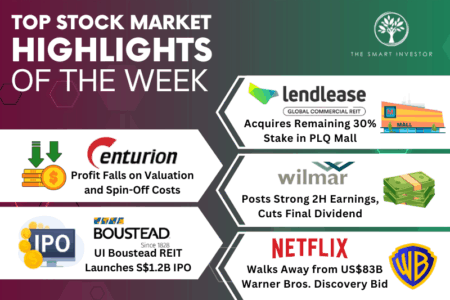The stock market is soaring.
Singapore’s Straits Times Index (SGX: ^STI) closed above the 4,400 level last Friday (3 October), a historical high after advancing approximately 16.5% in 2025.
This surge has, unsurprisingly, sparked a wave of excitement and urgency, fueling the fear of missing out (FOMO).
However, history has shown that such hot markets can be deceptive, often misleading individual investors into costly mistakes.
While each investor may respond differently at market highs, the critical question isn’t whether to invest, but how to maintain discipline amid the rapid rise in share prices.
Why Hot Markets Tempt Investors
A rising market creates an illusion of easy profits, as FOMO drives investors to chase prices higher while the media buzz strengthens the pack mentality.
As the index continues its rise, even cautious investors have the impression that it is better to be quick than to be disciplined.
The appeal of quick profits justifies the placing of more reckless wagers that are not properly evaluated.
The Dangers of Chasing Highs
Buying at inflated valuations means paying premium prices that leave little room for future returns.
Stocks priced for perfection can suffer from major selloffs even with minor disappointments.
History shows that sharp corrections often follow periods of euphoria, erasing gains quickly.
When markets eventually fall, the investors who were swept up by FOMO will often react emotionally, selling in panic, and in the process, undermining their own long-term wealth creation.
How to Invest Wisely in a Hot Market
But if that is the case, how do you keep your money safe in hot markets?
Here are five rules to follow during market highs.
- Focus on the fundamentals: When investing, analyse earnings and cash flow as well as the balance sheet. Even in uncertain times, well-run businesses can still create value.
- Use dollar-cost averaging: Investing a fixed amount at regular intervals over time, regardless of market conditions, helps to smooth out your average cost.
- Invest in multiple sectors: Focusing only on the hottest trends such as technology or AI can be risky, while diversification helps reduce volatility.
- Conserve cash: Keep cash to make the most of market volatility. Cash provides the flexibility to act when opportunities arise.
- Think long-term: Compounding rewards patience. Investors who consistently reinvest in quality companies, rather than timing the market, are more likely to reap the fruits of their investments.
Examples From Singapore’s Market High
Singapore’s current bull run highlights how quality companies can thrive even when prices look elevated.
Three blue chip stocks: DBS Group Holdings (SGX: D05), Singapore Exchange (SGX: S68), and Singtel (SGX: Z74) demonstrate why fundamentals matter.
DBS closed on Friday at S$52.86, a whisker away from its 52-week high of S$53.24.
For the second quarter of 2025 (2Q2025), total income rose 4.6% year on year (YoY) to S$3.6 billion despite a slight dip in net interest margins.
Over the same period, the bank reported a net profit of S$2.8 billion, a 1.3% YoY increase.
DBS also announced a S$0.75 dividend per share for the quarter, consisting of an ordinary dividend of S$0.60 and a capital return dividend of S$0.15.
At its current price, shares offer a 5% yield.
With a market capitalisation of S$150 billion, DBS shows why financial strength and digital transformation underpin resilience in all market conditions.
Meanwhile, Singapore Exchange posted record results for its fiscal year ended 30 June 2025 (FY2025), with net profit of S$648 million, up 8.4% year on year.
Net revenue grew 11.7% to approximately S$1.3 billion as trading activity surged.
SGX announced a rising dividend policy, committing to increase quarterly dividends by S$0.0025 cents annually from FY2026 through FY2028.
The bourse operator’s IPO pipeline is the strongest in years, supported by market reforms and institutional inflows.
At S$17.53 last Friday, SGX attracts investors seeking exposure to Singapore’s economic dynamism and growing capital markets.
Shares offer a dividend yield of 2.1%.
Elsewhere, Singtel delivered a five-fold increase in net profit to S$4.02 billion for its fiscal year ended 31 March 2025 (FY2025), boosted by a one-off gain from its Comcentre divestment worth S$1.3 billion.
For 1QFY2025, underlying profit rose 14% year on year to S$686 million.
Shares climbed to S$4.25, the highest it’s been since 2015, following the announcement of a S$2 billion share buyback programme and asset monetisation plan.
The future prospects of Singtel are reinforced by strong regional contributions, especially by the increasing data centre business of Singtel, along with strong contributions from Bharti Airtel.
Stable dividends along with commitment from the company towards ensuring returns to shareholders is a matter of concern for the investors.
These examples demonstrate why investors must look beyond market momentum to examine underlying fundamentals.
Get Smart: Stay Disciplined in Hot Markets
One should approach a hot market with the discipline of a patient investor and not dive head-first.
Investors can reap success in a bull market by combining disciplined dollar-cost averaging, avoiding cash-flow negative investments, and maintaining a well-diversified portfolio positioned for sustainable long-term growth, regardless of short-term market swings.
DBS, SGX, and Singtel exemplify why strong businesses can still provide investors with decent dividend yields even at elevated prices.
True wealth comes not from chasing market highs but from compounding returns in quality companies through every cycle.
The world’s gotten unpredictable, but some Singapore companies have quietly kept thriving. You’ve probably seen them in your daily life. And yes, they’ve kept paying dividends through it all. Meet 5 resilient stocks built to navigate global storms. Get the free report here and see how they’ve done it.Follow us on Facebook, Instagram and Telegram for the latest investing news and analyses!
Follow us on Facebook, Instagram and Telegram for the latest investing news and analyses!
Disclosure: Joanne owns shares of DBS.





